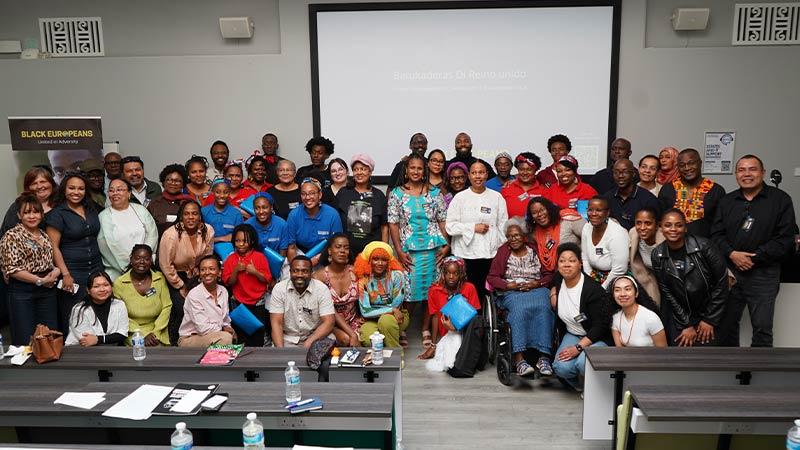To mark Europe Day, the first-ever European Union (EU) Minorities Summit took place at the University of Westminster on 10 May, bringing together Black and minority ethnic EU citizens from across Europe and institutions to support the fight for equity.

The landmark event hosted by the University was organised by Black Europeans (BE), a group led by European Minority Ethnic Citizens (EUROMEC), and aimed to draw activists, community leaders, policymakers and young changemakers for a day of workshops, dialogue, culture and strategy. Cristina Cabral, Co-founder and Director of BE and Professor Winston Mano, Director of Westminster’s Africa Media Centre and Course Leader of the Media and Development MA course, hosted the event.
Irina Do Carmo, BE Policy Officer, and Professor Mano welcomed attendees to the summit with an opening speech. This was followed by a keynote speech by Dr Dapo Ladimeji, Founding Editor of the African Century Journal and Chair of the Africa Region of the International Fiscal Association (IFA).
The summit continued with a Q&A led by Mayor of Newham Rokshana Fiaz OBE and Alice Bah Kuhnke, Swedish politician and Member of the European Parliament. The session focused on empowering political participation among Black and ethnic minority citizens and bridging the democratic deficit. Parallel workshops on systemic racism, the climate crisis and queer migration were hosted by grassroot groups to develop policy proposals.
Attendees then had the opportunity to connect with each other over a Caribbean lunch and watch a dance performance by Batucadeiras RU, a dance group of Cape Verdean descendants living in the UK who promote their country’s cultural heritage through dance.
Another Q&A session, titled Who Gets to Heal? A Dive into Racial Bias in Healthcare, followed and highlighted how racial bias in healthcare contributes to unequal treatment and worse outcomes for Black and Asian patients.
Aké Achi, Chief Executive Officer of BE, and Aisha Rage from Dream Chaser Youth Club, gave a presentation on the Race Equity Action (REACT) Framework, which is a structured approach to identifying and dismantling systemic racism by embedding equity into institutional policies, practices and culture. They highlighted its goals, explained how to get involved with BE and paved the way for the presentations that followed by EU officials and stakeholders on lived experiences related to the framework.
The day concluded with reflections and a special musical performance by Love Itoya, London-based Greek-Nigerian pop fusion artist, as well as a drinks reception, hosted by the University’s Black History Year team.
Black Europeans is a grassroots-led organisation that formed as a result of the barriers faced in the EU Settlement Scheme (EUSS) and post-Brexit. It works to amplify these voices and build equity in collaboration with EU institutions. The summit builds on the group’s work with the EU Delegation and Member State embassies through the EUROMEC Monitoring Network.
Dr Mano said: “This inaugural meeting was long overdue in terms of recognising the presence and important contribution of Black and minority migrants in the EU. It was a remarkable opportunity to self-define, historicise and humanise themselves. The rise of right-wing politics is bad news for the group as they are used as scapegoats. It offered them a chance not just to analyse trends but to document and push back on attacks against them within the region. It was a moment to create allyship and strategies for survival. I also saw it as therapeutic in its yearning to unsilence and enliven a marginalised group of Europeans so that they can live in conditions of dignity, consistent with democratic constitutional provisions in the EU.”
The EU Summit directly contributes to the United Nations Sustainable Development Goals (SDG) 10: Reduced Inequalities, 16: Peace, Justice and Strong Institutions and 17: Partnerships for the Goals. Since 2019, the University of Westminster has used the SDGs holistically to frame strategic decisions to help students and colleagues fulfil their potential and contribute to a more sustainable, equitable and healthier society.
Learn more about equality, diversity and inclusion at the University of Westminster.







